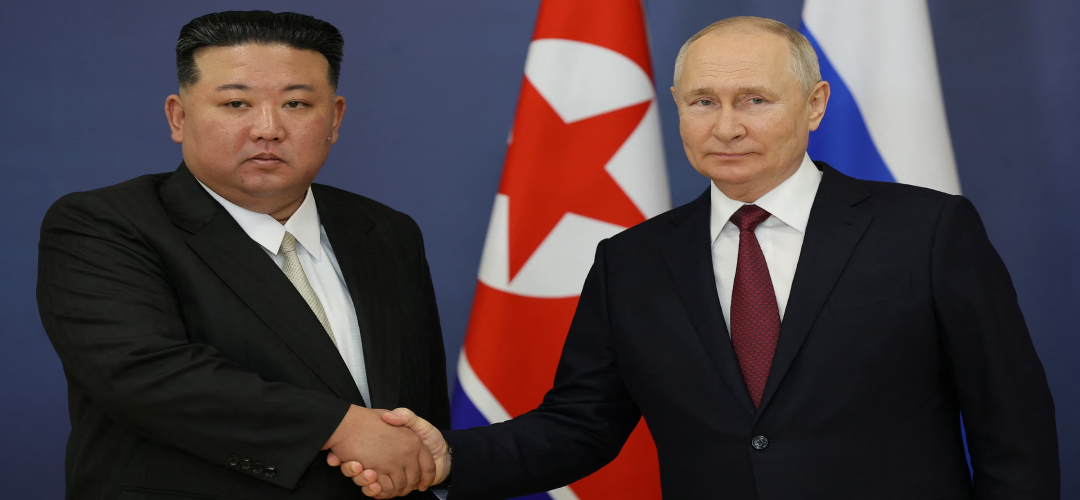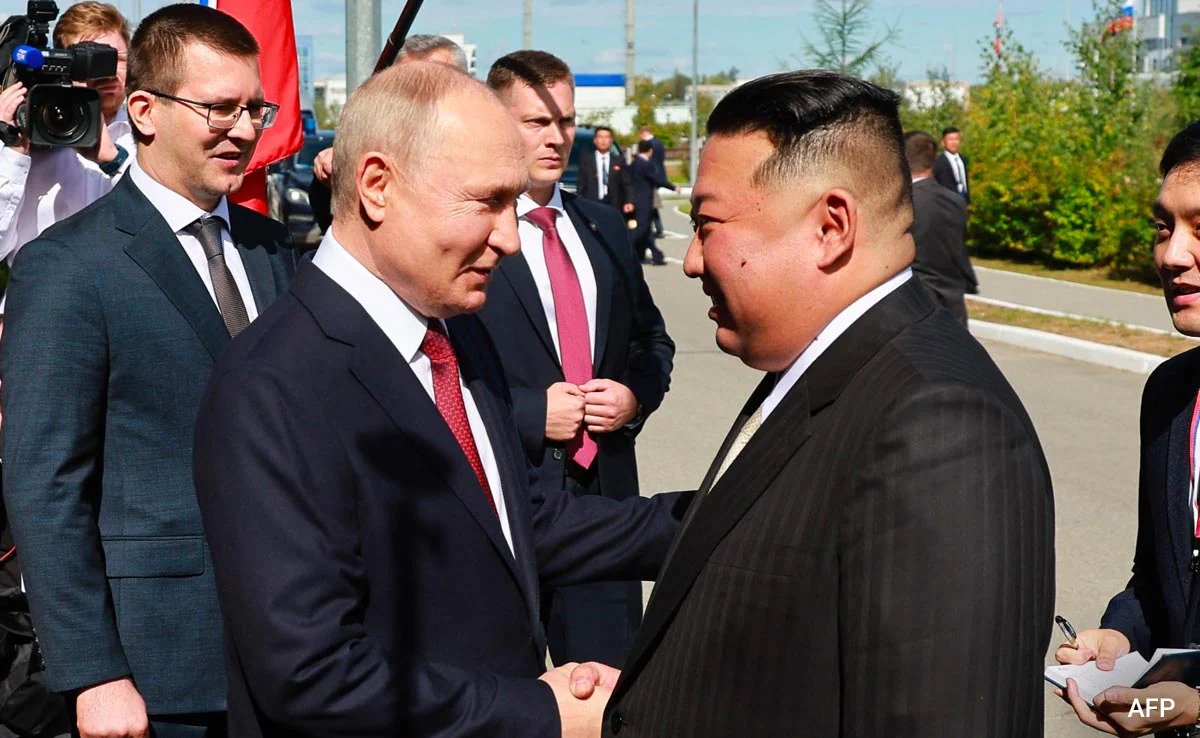Re-Igniting Old Friendship
September 16, 2023 | Expert Insights

The recent images of North Korean strong man Kim Jong-un boarding his palatial special train to call on Mr Putin revoked images of another strong man who also abhorred travelling by air- Adolf Hitler and his famous armoured personal train called Führersonderzug "Amerika." This iconic train carried the Fuhrer over his spreading empire and acted as a full-fledged command and control hub.
As Russia struggles for a partner, it is not surprising that it has been reaching out to other similarly isolated authoritarian regimes to join forces against the West.
This is not a new phenomenon. Since the end of the Cold War, global affairs have been defined by confrontation between the West and different axes of anti-Western countries. Various permutations and combinations have taken place in these anti-Western countries. So, many times, the formation of these axes became self-fulfilling prophecies. The involved countries generally had little in common other than a professed anti-Western ideology. Now, we are seeing this phenomenon play out again in the case of Russia and North Korea.
Background
North Korea and Russia have a close historical relationship.
The current North Korean state would not have been born if not for the diplomacy of the then-Soviet Union. Soviet forces were stationed in the northern half of the Korean peninsula after Japanese troops withdrew following the end of the Second World War. Like many other parts of the world, the USSR installed its puppet government in the portion of Korea it occupied. The leader of this government was the grandfather of the present North Korean leader, Kim II Sung.
Throughout the Cold War, North Korea became closely aligned with the USSR. It became a vocal supporter of the Soviet position in the global system. The Kim regime depended on Soviet support in all its forms at the time. This support was both economic and military in nature. Moscow’s economic assistance was a key lifeline for the regime.
By the time the Cold War was drawing to a close, this relationship had considerably soured. The USSR was no longer willing to support subordinate Communist nations in far-off places. The new Russian Republic, which replaced it, began to follow a pro-Western foreign policy, thus ending the special relationship with North Korea. Throughout the Cold War, Pyongyang had balanced between Moscow and Beijing. Post-1991, with one-half of these twin pillars gone, Pyongyang began to rely totally on Beijing. Russia has supported harsh sanctions against North Korea along with the Western powers. Things have come full circle in the engagement between Russia and North Korea.

Analysis
Westerners see this move by Vladimir Putin as a sign of his desperation, indicating that their sanctions are working. But this is a short-term mindset. The other side of this equation, North Korea, is no joking matter to be trifled with once it is embedded with a powerful military nation like Russia.
It is true that this is a huge gamble for the Russian President. The Democratic People’s Republic of Korea (DPRK) is much more isolated internationally than Russia. Its leader is highly unpredictable. The economy is autarkic in nature, and there is nothing much to speak of.
At the same time, this is not the whole picture. North Korea is a dagger at the heart of Western interests in East Asia. It is a revisionist power like Russia. Connections from the Cold War days still exist. And then, there is the common enemy in the form of the United States. All these factors are good enough for these two countries to come together.
This relationship will not be like that of the past. Today, the tail is wagging the dog. North Korea is no longer anyone’s client state anymore. It cannot be taken for granted. The Chinese still have some influence on the North Korean leadership. However, this is minimal. Pyongyang will not do any other country’s bidding. This will be a partnership of equals.
The two leaders concerned are both mercurial. For the incumbent North Korean leader, it is no stretch of the imagination to support a like-minded country against Western aggression. In this context, it does not matter that Russia previously sided with the West against North Korea. This situation explains the fluid nature of international relations, which has been true throughout history.
The West’s moralizing here on autocracy and human rights will not help. Russia will benefit from this alliance. It will receive a fresh supply of weapons, which will help it cover up its ammunition shortfall. This will allow the war in Ukraine to continue further into the future. The weapons supply Russia will receive from North Korea is no different from the one the West is giving Ukraine. Both sides are fuelling this intractable war in their own way.
For North Korea, this Russian embrace could be a game-changer. For a long period of time, the only other country with which the DPRK had any semblance of a close relationship was China. The rest of the world was closed to Pyongyang.
South Korea is becoming more powerful day by day, both economically and militarily. U.S. support for Seoul is unconditional and iron-clad. Now, even Japan and South Korea have resolved their differences in the face of the common threat from North Korea. The odds are stacked against Pyongyang. Some power has to balance the combined danger of South Korea, Japan and the US to North Korea. Russia fits the bill perfectly here. The Russian economy might have contracted under Western sanctions, but it is still large. Moscow remains a permanent member of the UN Security Council. All these factors were taken into consideration when Kim Jong-un made his decision to visit Russia.
The implications for the world of this realignment are grave. North Korea is a dangerous nuclear power. It has continued to carry out nuclear missile tests despite a bevvy of Western sanctions. Two hurdles were holding back the Pyongyang regime here. One is that the impoverished North Korean economy can no longer support the delusional fantasies of Kim Jong-un. A military-first policy is clearly not working in this country anymore. Second is the technological aspect. The Kim regime needs the latest missile and rocket technology to have a successful nuclear missile. More importantly, it must develop the nuclear triad- the submarine component of the strategic deterrent. This could be fulfilled by Russian technology in nuclear-powered, nuclear-armed ballistic submarines.
A convergence of interests has emerged between Pyongyang and Moscow in the military sphere. The recent visit of Russian defence minister Sergei Shoigu to North Korea was unsurprising. During the visit, he attended an arms exhibition by the North Korean leader. The items on display in this exhibition included intercontinental ballistic missiles, long-range hypersonic missiles, newly unveiled advanced drones, and a variety of other weapons.
On the economic side of the partnership, the highly curtailed Russian economy still has much to offer. Russia remains one of the largest food suppliers to the world. A hungry and starving North Korean population needs all the food it can get. Energy-wise, North Korea is substantially deficient. Even though Russia has been cut off from the world energy markets, this does not matter for the DPRK. In fact, this is even better as North Korea will join the list of the few countries in the world to which Russia is continuing to supply energy. North Korean agriculture is in dire need of fertilizers. As an agricultural powerhouse, Moscow will have no problem assisting Pyongyang here.
Is this a re-emergence of the Cold War alliance system in East Asia? As the North Korean leader said, he is offering Vladimir Putin his support for Russia's "sacred fight" against the West. Once again, great power politics are being played out in East Asia.
Assessment
- North Korea was already supplying arms to the Russian forces right from the beginning of the Ukraine war. This was through the private military Wagner group. Now, this weapons supply has come out in the open.
- This Russia-North Korea re-engagement could not have come about without China’s blessings. Beijing has played a behind-the-scenes role here.
- Both the Korean Peninsula and the Russia-Ukraine frontline are on a knife’s edge. With Russia moving closer to North Korea, this is not good for world peace.








Comments